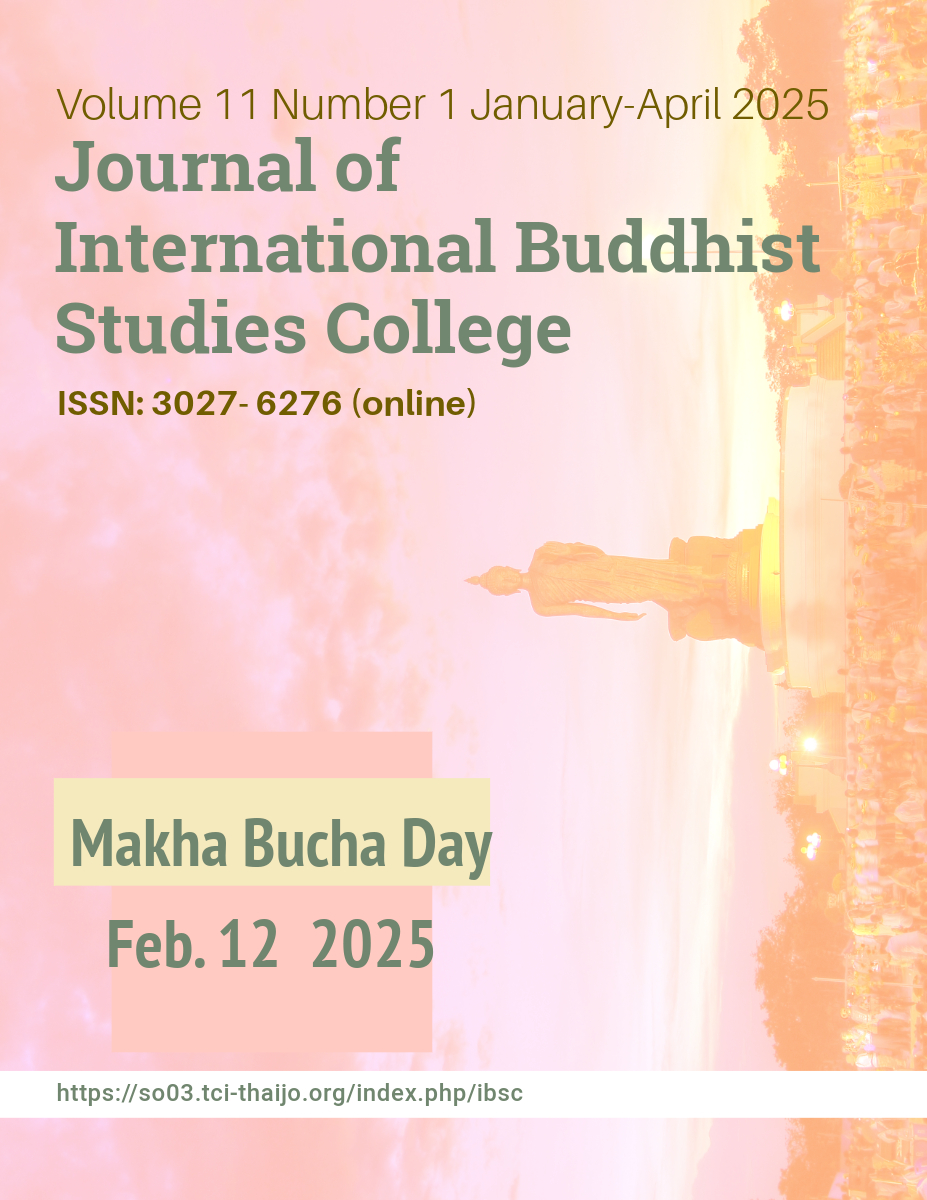Applying Loving-kindness Practice Under Buddhist Perspective in the Japanese-Vietnamese Cross-cultural Environment at the Workplace in Vietnam
Main Article Content
Abstract
This article examines the application of Buddhist loving-kindness (Mettā Bhāvanā) in addressing cultural conflicts within the Japanese-Vietnamese cross-cultural workplace environment in Vietnam. The study aims to study (1) the causes leading to cultural conflict in the workplace between Japanese and Vietnamese in Vietnam, (2) concepts and theories of loving-kindness practice under Buddhist perspective, and (3) To propose loving-kindness practice process under Buddhist peaceful means in the Japanese-Vietnamese cross-cultural environment at workplace in Vietnam. Utilizing a qualitative methodology, the research gathers insights through in-depth interviews with Buddhist scholars and business professionals involved in Japanese-Vietnamese joint ventures.
The findings reveal that cultural conflicts often stem from differences in communication styles, work ethics, hierarchical structures, and expectations regarding professional conduct. Japanese corporate culture, characterized by indirect communication, strict discipline, and a collective work ethic, often contrasts with the more flexible, hierarchical, and relationship-oriented Vietnamese work culture. These disparities frequently result in misunderstandings and tensions in the workplace. The research highlights that incorporating Buddhist loving-kindness practices can effectively bridge these cultural divides, fostering empathy, mutual respect, and emotional intelligence. Employees can adopt a mindset prioritising understanding over conflict by cultivating compassion and enhancing collaboration and workplace cohesion.
Furthermore, the study suggests that organizations can integrate loving-kindness practices through structured training programs, workshops, and leadership development initiatives. This may involve a secular adaptation of Buddhist principles derived from Theravāda, Mahāyāna, and Vajrayāna traditions, promoting inclusivity in diverse corporate environments. However, challenges persist, particularly in aligning these values with profit-driven business objectives. Some leaders may view loving-kindness as a sign of weakness, necessitating a strategic approach to demonstrate its value in boosting long-term productivity and employee well-being. Ultimately, this research emphasizes the transformative potential of loving-kindness practices in multicultural workplaces, offering a sustainable approach to conflict resolution, employee satisfaction, and organizational harmony.
Article Details
The Journal of TCI is licensed under a Creative Commons Attribution-NonCommercial-NoDerivatives 4.0 International (CC BY-NC-ND 4.0) licence unless otherwise stated. Please read our Policies page for more information on Open Access, copyright and permissions.
References
Ashmaul, H., & Khandoker, M. H. (2024). Loving-kindness in organizational ethics: A pathway to sustainable business. Journal of Buddhist Ethics, 31(2), 45–67. https://doi.org/10.1080/ethical.2024.123456
Bush, R. A. B., & Folger, J. P. (2005). The promise of mediation: The transformative approach to conflict. Jossey-Bass.
Dena, A. M., & Haque, K. W. (2024). Ethical Leadership and Cultural Values: The Role of Buddhism in Shaping Modern Business. Asian Review of Social Sciences, 13(1), 17–22. https://doi.org/10.70112/arss-2024.13.1. 3909
Do, V. K. (2024). Cross-cultural adaptability in Vietnam’s evolving workforce. Vietnam Economic Review, 12(3), 88–104.
Hall, E. T. (1976). Beyond culture. Anchor Books.
Halverson, C. B., & Tirmizi, S. A. (2008). Effective multicultural teams: Theory and practice. Springer Science & Business Media. https://link.springer. com/book/10.1007/978-1-4020-6957-4
Hofstede, G. (1980). Culture’s consequences: International differences in work-related values. Sage.
Kim, T.-Y., Wang, C., Kondo, M., & Kim, T. H. (2007). Conflict management in Japanese-Vietnamese joint ventures. Asian Business & Management, 6(4), 409–430. https://doi.org/10.1057/palgrave.abm.9200233
Matsumoto, K. (2023). Communication styles in multicultural workplaces. Journal of Multicultural Workplaces, 14(2), 34–45.
Lonsing, K. (2021). Cultural conflicts in business environments. Cross-Cultural Studies, 11(1), 22–29.
Matsumoto, D. (2007). Culture, context, and behavior. Journal of Personality, 75(6), 1285–1320. https://doi.org/10.1111/j.1467-6494.2007.00476.x
Moore, C. W. (1986). The mediation process: Practical strategies for resolving conflict. Jossey-Bass.
Moore, C. W. (2014). The mediation process: Practical strategies for resolving conflict. John Wiley & Sons.
Petrina, C. (2015). Buddhism at work: An analysis of the impact of Buddhist concepts and practices on Western organisations.
Rapaille, C. (2019). The culture code: An ingenious way to understand why people around the world live and buy as they do. Crown Business.
Singh, S. (2024). Cross-Cultural Management Practices in Multinational Corporations: Enhancing Organizational Effectiveness. Universal Research Reports, 11(4), 159–164. https://doi.org/10.36676/urr.v11.i4. 1344
Tajfel, H., & Turner, J. C. (1979). An integrative theory of intergroup conflict. In W. G. Austin & S. Worchel (Eds.), The social psychology of intergroup relations (pp. 33–47). Brooks/Cole.
Thich Thien An. & Brahm, A. (2018). Loving-kindness and mindfulness: A Buddhist approach to harmony. Buddhist Wisdom Publications.
Thich, T. A. (2018). Understanding Japanese culture and language. Van Lang Culture Publisher.
Thomas, D. C., & Inkson, K. (2003). Cultural intelligence: People skills for global business. Berrett-Koehler.
Vashistha, H., & Harikrishnan, M. (2024). A Study on Cultural Diversity in Higher Education Workplace. 03(09), 588–593. https://doi.org/10. 70333/ijeks-03-09-015
Vijayakumar, A., & Davidova, J. (2024). Comparative Study on the Impact of Human Factors on Operational Performance of Innovation Hubs. Management Dynamics in the Knowledge Economy Journal, 12(3), 202–220. https://doi.org/10.2478/mdke-2024-0013


